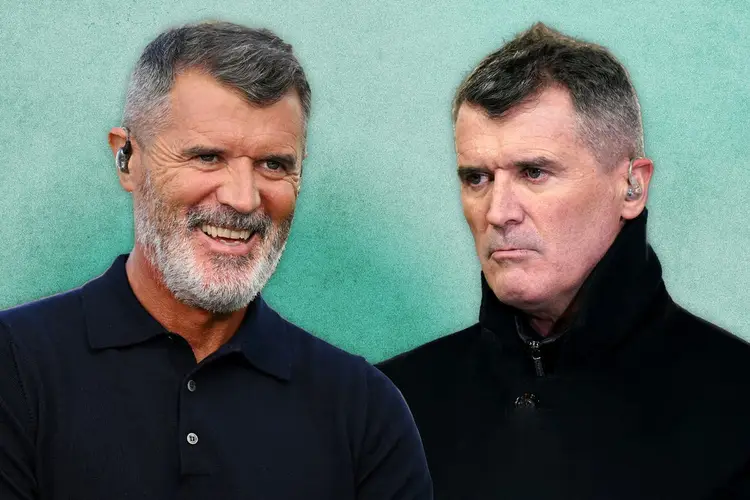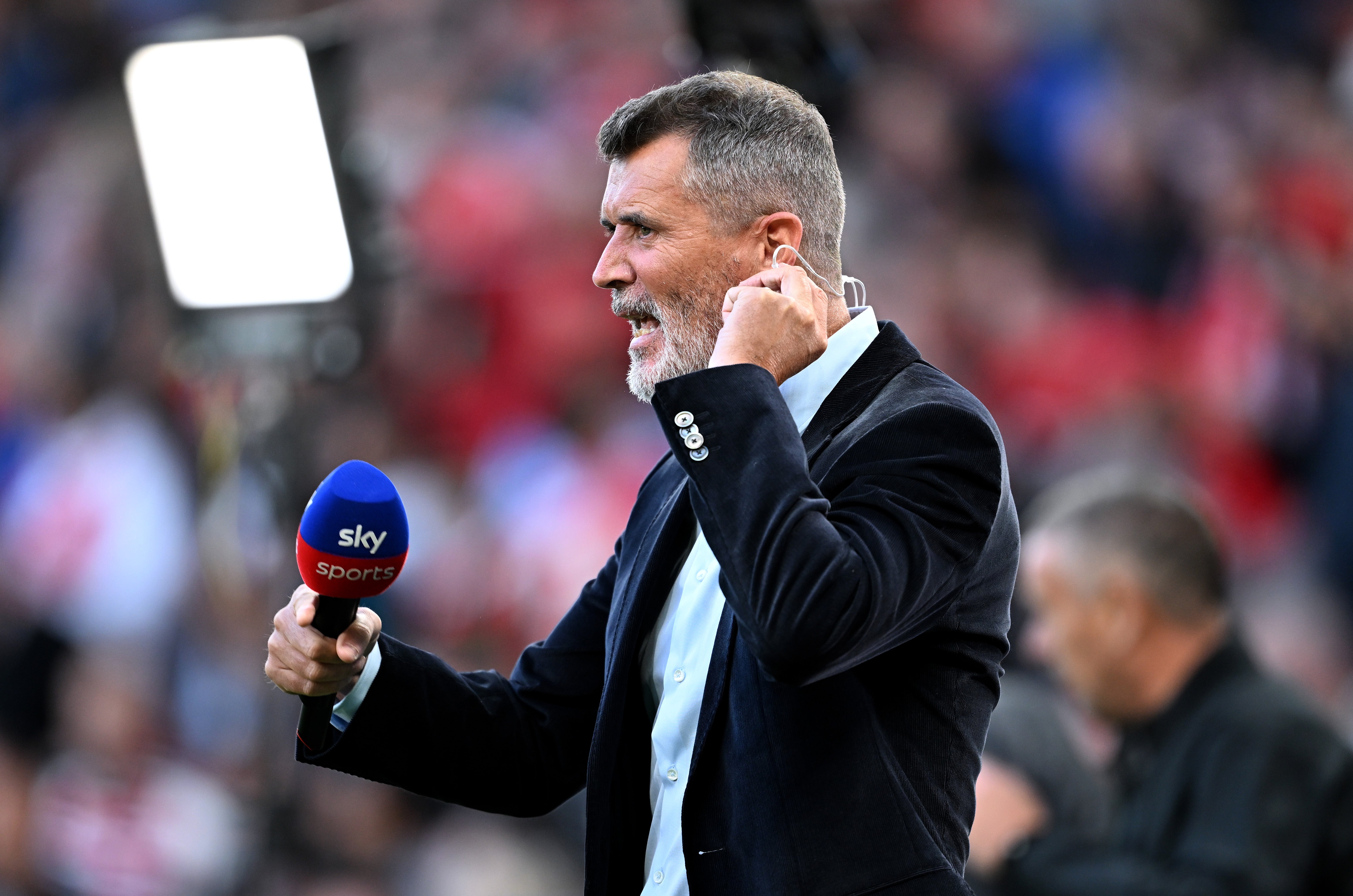Roy Keane must be protected at all costs or lost from our TV screens for good

Subscribe To Miguel Delaney’s Free Newsletter!
Join Miguel Delaney's Free Weekly Newsletter
Subscribe To Miguel Delaney’s Free Newsletter
I would appreciate receiving emails regarding promotions, events, and news from The Independent. Please review our privacy policy.

You might have come across the footage of Roy Keane engaging with an Ipswich supporter over the weekend. After hearing the fan's taunts from the Sky Sports sidelines, Keane casually puts his hands in his coat pockets—transforming an everyday gesture into something slightly intimidating—and confidently approaches for a spirited discussion.
Keane can be heard asking the fan to meet him later in the parking lot, a phrase that's commonly recognized in pub culture. However, he cleverly adds, “we’ll discuss it,” which leaves people wondering if he's setting up a fight or planning a Zoom call. Security intervenes, and the moment fades. Jamie Redknapp shows up noticeably late, saying “just leave it,” well after everyone has already moved on. It's possible the fan left the stadium early to avoid the traffic, as the expected parking lot meeting never took place.
All of this would seem like a big deal over nothing if similar events didn’t occur frequently. For instance, last year, an Arsenal supporter was convicted for headbutting Keane at the Emirates Stadium. Keane has been recorded getting into confrontations with fans at various locations, so the incident at Ipswich wasn’t unexpected, especially considering his tumultuous tenure as a manager there. Looking back, it was probably unwise to place him in such a vulnerable situation so near to the fans.
It's true that Keane sometimes makes his situation worse by attracting football fans who are eager to criticize him, much like moths drawn to a flame he has created. However, he's not the only one facing harassment. Gary Neville often faces insults and has even had drinks thrown at him outside the Etihad Stadium. Additionally, female pundits receive harsh criticism on social media whenever they speak about men’s football. It seems that abuse is just part of the job, but Keane genuinely seems fed up with it all, to the point where he has considered quitting.
When asked if he sees himself as a pundit in a decade, Keane recently responded: "I’m going to have a tough time with this for the next ten months. I enjoy football, but dealing with matches, traveling to games, and the whole fan situation is challenging. Just a few months ago, I had to go to court because someone headbutted me. Do I like that aspect of it? Definitely not. The games themselves are great, but the process of getting there, finding parking, and having people yell my name—both good and bad—is a hassle. Will I be a pundit in ten years? I don’t think so."
A few years back, his departure wouldn’t have made a significant impact on television. Keane was mostly employed as a talking head, brought in for a scripted 45-second tirade against something or someone—most often, the “shameful” players of Manchester United. These rants could easily be edited and shared globally, even before a match that didn’t feature Manchester United. True analysis was rare; instead, it was more about a calculated social media approach, which proved to be effective.
It captures a bit of Keane's captivating presence on screen, suggesting that at any point, he could lash out and hit Neville while leaning over Jimmy Floyd Hasselbaink. We know he won't actually do it, of course, but the possibility lingers in the air. While he wouldn't really act out that way on live television, his tense grip on the arm of his chair hints at a simmering intensity. So, could he?
Despite still having that intense fire ready to burst forth at any moment, a gentler and more fatherly version of Keane has come to light lately. His interactions with the boisterous Micah Richards have helped showcase a more complex side of Keane on television, highlighting his ability to poke fun at himself. Now, his participation in the laid-back setting of The Overlap has allowed this lighter aspect of his personality to shine through, uncovering him as one of the best storytellers of our era.
He shares his tales of wild, drunken adventures from his football days with a perfect sense of humor and timing. One standout story is about how he ended up crashing through a glass door at a wine bar when he was starting out at Manchester United. Another memorable moment came when Neville asked him if he had ever apologized to anyone during his career. With a sly smile, Keane replied, “I don’t think I ever did anything wrong,” which had everyone in stitches.
In a recent episode, Jill Scott brought up a memorable moment when she faced off against ex-West Ham striker Marlon Harewood, who really dominated her women's team. Keane couldn't help but ask, “So, how did that match go?”
The Express mentioned that Keane was facing backlash over his crude joke, but it turned out that the criticism stemmed from a tweet by Piers Morgan, who provocatively challenged “the overly sensitive woke crowd” to be offended. In reality, no one reacted negatively except for Morgan himself. Keane possesses a certain universal appeal that can't be easily politicized, no matter how much some people may attempt to do so.
Videos on YouTube or social media often have comments like “I’ve always disliked Manchester United, but you can’t help but admire Roy Keane.” This shows how he has made a surprising shift from being a tough football player to someone many would enjoy having over for dinner. Like many great comedians, he has a signature phrase that he uses often – saying “that’s his job” at just the right moments.
It might suggest an aspect of sports: we can never fully understand an athlete until their career comes to an end and their competitive spirit has faded. Keane has settled into a reliably cantankerous persona in his later years, embodying an old-school mentality in a tech-driven era. He doesn’t take himself too seriously, balancing being relatable without falling into the category of a washed-up player, all while maintaining a genuine skepticism towards modern metrics like expected goals.
By doing this, he has turned into a valuable asset, and if Keane is truly at his breaking point, football fans might soon miss one of the rare bright spots in the sea of negativity that often surrounds modern football discussions. Sky Sports and the broader football community need to support him and safeguard his contribution.















































